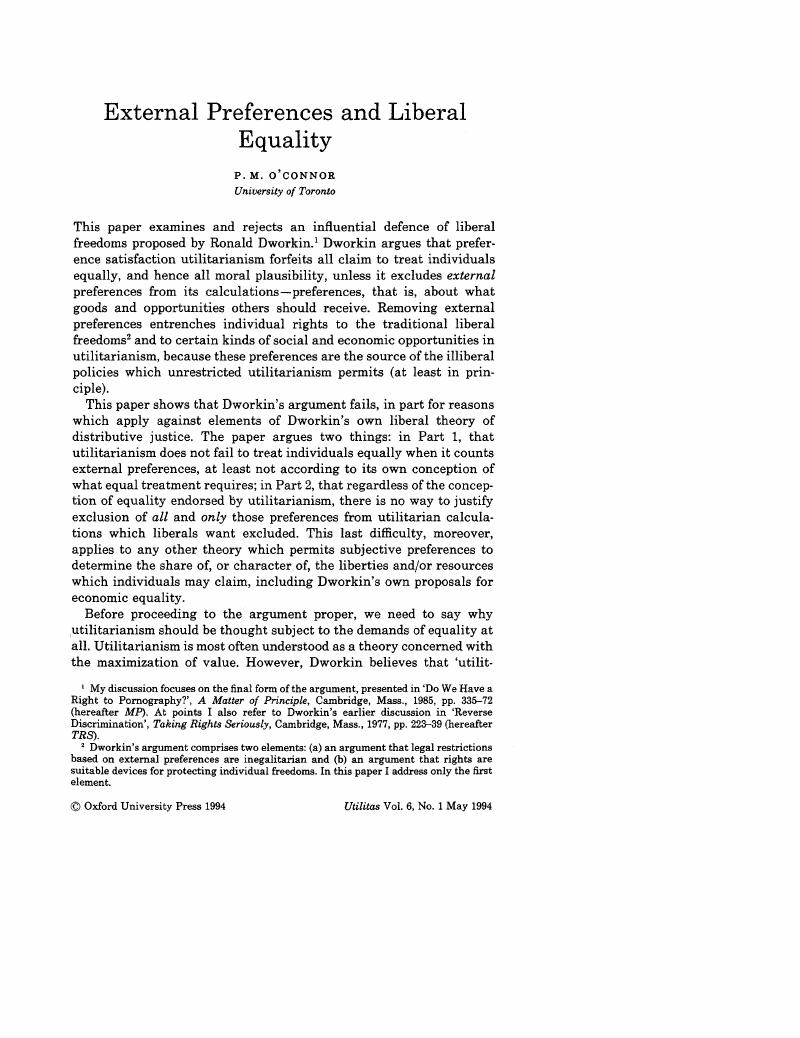No CrossRef data available.
Article contents
External Preferences and Liberal Equality
Published online by Cambridge University Press: 26 January 2009
Abstract

- Type
- Discussion
- Information
- Copyright
- Copyright © Cambridge University Press 1994
References
1 My discussion focuses on the final form of the argument, presented in ‘Do We Have a Right to Pornography?’, A Matter of Principle, Cambridge, Mass., 1985, pp. 335–72Google Scholar (hereafter MP). At points I also refer to Dworkin, 's earlier discussion in ‘Reverse Discrimination’, Taking Rights Seriously, Cambridge, Mass., 1977, pp. 223–39Google Scholar (hereafter TRS).
2 Dworkin's argument comprises two elements: (a) an argument that legal restrictions based on external preferences are inegalitarian and (b) an argument that rights are suitable devices for protecting individual freedoms. In this paper I address only the first element.
3 For a defence of this interpretation of utilitarianism see, for example, Kymlicka, W., ‘Rawls on Teleology and Deontology’, Philosophy and Public Affairs, xvii (1988), 173–90Google Scholar, and Hare, R., ‘Rights, Utility and Universalization: a Reply to J. L. Mackie’, Utility and Rights, ed. Frey, R., Minnesota, 1984, pp. 106–20Google Scholar. For criticism see, for example, Baier, K., ‘Maximization and Fairness’, Ethics, lxxxxvi (1985), 119–29.CrossRefGoogle Scholar
4 Just how this double-valuing of Sarah's preference affects the mechanics of the summing procedure, and its outcome, is a further question. Whatever the answer to that question, the point is that the utilitarian engages in a moral inconsistency when this preference is double-valued.
5 It is not clear that counting such a ‘second-order’ preference would involve utilitarianism in a contradiction. Were the Nazi preference for his theory of justice counted in such a procedure, and were it successful, its success—that is, its justification as the right theory of justice—would itself be justified on utilitarian grounds. The Nazi's claim to the truth of his theory of justice would have been subverted by the utilitarian procedure by which it was validated.
6 Dworkin's argument would also justify a proliferation of individual rights against others' pursuit of their own ends which might be thought to trivialize the notion of a right. I leave this issue aside.
7 Joel Feinberg, for instance, ends up defending the exclusion of moralist preferences by appeal to the way in which moralist legislation strips its victims of autonomy. See his Harmless Wrongdoing: the Moral Limits of the Criminal Law, Oxford, 1990, pp. 55–64.Google Scholar
8 See, for example, his ‘Foundations of Liberal Equality’, Tanner Lectures On Human Values, xi (1990), 1–8O.Google Scholar
9 ‘What is Equality? Part II: Equality of Resources’, Philosophy and Public Affairs, x (1981), 283–345.Google Scholar
10 ‘What is Equality? Part III: The Place of Liberty’, Iowa Law Review, lxxiii (1987), 36–7.Google Scholar
11 Sweatt v Painter, 339Google Scholar U.S. 629, 70 S. Ct. 848.
12 ‘What is Equality? Part III: The Place of Liberty’, Iowa Law Review, lxxiii (1987), 1–54.Google Scholar


